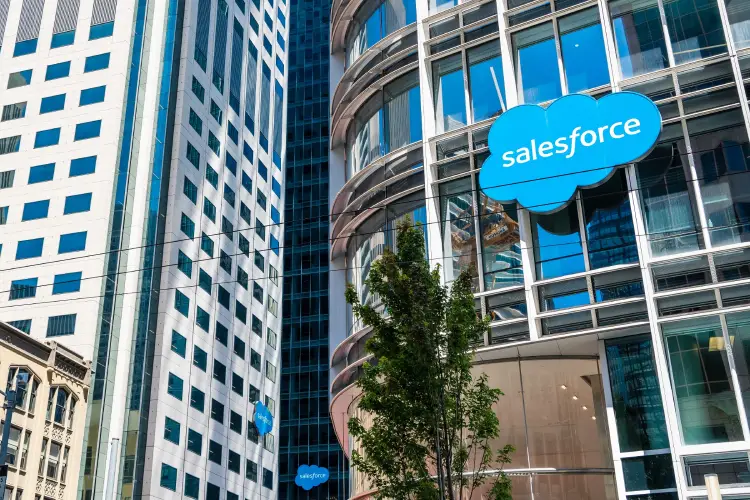
Two of cloud computing’s biggest names, AWS and Salesforce, announced a closer integration of their products this week. The alliance is mutually beneficial for the duo, both of which face competition from Microsoft in their respective markets, and could also aid enterprise customers by streamlining the digital transformation process.

The partnership will mean developers using AWS can connect Salesforce data natively into new applications they build on the public cloud platform, while those using Salesforce’s CRM tools will be able to easily integrate AWS workflows. Salesforce says it will also embed AWS services for voice, video, and AI directly into some new applications.
“With a more strongly unified Salesforce and AWS platform, our customers around the world can create a single source of truth across sales, service, marketing, and commerce, and achieve success from anywhere,” said Marc Benioff, chair and CEO of Salesforce.
The announcement builds on an already close relationship between the companies, which are leading the way in their respective markets but face stiff competition.
What is the relationship between AWS and Salesforce?
Salesforce has been relying on AWS as its primary public cloud provider since 2016 when the companies signed a deal worth $400m, and AWS also uses Salesforce as its CRM platform. “They’ve been working closely for some time,” says Jason Wong, VP analyst at Gartner. “And when you look at the people involved, with Adam Selipsky going from AWS to Tableau and now back to AWS, it’s clear these companies are closely connected.” Selipsky, recently appointed as AWS CEO, previously spent 11 years in Amazon’s cloud division before leaving to take the CEO role at Tableau, a software company subsequently acquired by Salesforce for $15.7bn in 2019. Wong also points out that AWS training modules are already available on Salesforce’s Trailhead training platform, which doesn’t feature any other public providers.
Both Salesforce and AWS dominate in their respective domains, and have enjoyed rapid revenue growth in recent years, accelerated by the pandemic and the swift digital transformation that ensued at many businesses.
But both are under pressure from Microsoft, which has the second-largest share of the public cloud market through its Azure platform, and is building its position in CRM with its Dynamics CRM offering. Salesforce's purchase of enterprise communications platform Slack was seen by many as a move by the company to offer an alternative to the combination of Dynamics CRM and Microsoft Teams, which is central to MSFT's future plans.
How will customers benefit from the AWS and Salesforce integration?
By working more closely together, AWS and Salesforce plan to offer a smoother user experience for businesses across the two platforms. Charlotte Dunlap, principal analyst for application platforms, enterprise technology and services at GlobalData, says the move is likely to be welcomed by users. "Customers seeking successful app modernisation will invest in solutions which abstract the complexities of the digitisation process," Dunlap says. "By enabling deeper integration between AWS cloud services and Salesforce's developer platform and its business apps, the two companies will eliminate much of the integration and data connectivity requirements associated with modern, interactive applications."
Dunlap adds that AWS may see closer ties with Salesforce as a way to help its customers access low-code tools, which enable users to build new apps without requiring deep programming knowledge. "Advanced technologies such as low-code tools and automation workflow have played a major role in advancing DevOps interests under new application architectures which support continuous distribution," she says. "Low-code and intelligent automation are areas where Salesforce has heavily invested, while AWS has been slower to respond.''
Last December, Salesforce announced Hyperforce, a new cloud architecture which will allow users to choose which public cloud they deploy the company's tools on. Wong says this week's announcement means selecting AWS ahead of its rivals will be beneficial for customers. "The new tools won't launch until 2022, so I don’t think there will be any direct disadvantages if you’re planning to use Azure, Google Cloud Platform (GCP) or Alibaba Cloud," he says. "But if you’re already a user of AWS these new connecters will make life easier when they launch."
What does the future hold for Salesforce?
Wong expects to see more announcements on how the relationship between AWS and Salesforce impacts Hyperforce in the near future. Salesforce has long been rumoured to have ambitions to launch a public cloud of its own, but its increasing integration with AWS would appear to make this unlikely, and Wong does not anticipate such a move anytime soon. "[Salesforce] has already managed to build a successful business without getting involved at that level of the stack, where there are already several dominant players," he argues.
The increased integration also raises the question of whether Salesforce might one day be an acquisition target for Amazon, but Wong is doubtful that they would be compatible. "If you look at Salesforce’s own acquisition strategy, they put a big emphasis on the importance of cultural fit, and I think AWS and Salesforce have two very different cultures," he says.






